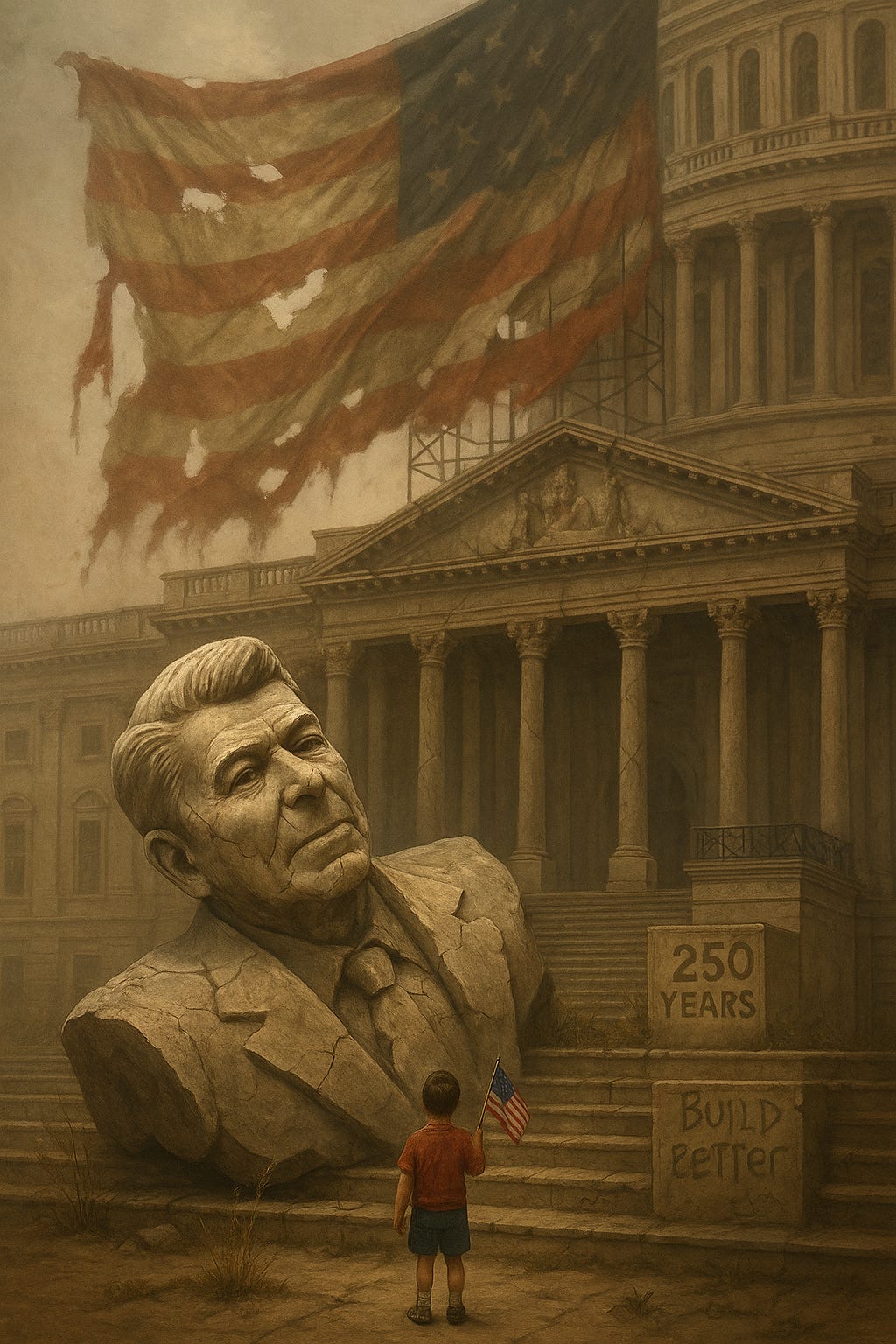250 Years We Lasted
Christine Merser, July 28, 2025
I keep thinking about our 250th birthday. It’s this year. Is anyone celebrating?
I was in New York City for the bicentennial. 1976. The tall ships came in from all over the world. There were flags, parades, fireworks over the Hudson. I remember thinking, this country, for all its flaws, was still the best show on Earth. Still trying. Still inching forward. We’d come through Vietnam, through Nixon, through gas lines and Kent State. But there was hope. Still a collective belief that we were going somewhere.
Now it’s 250 years. And something is broken that wasn’t broken back then.
This is not nostalgia talking. It’s not about halcyon days or rose-colored glasses. It’s about the slow, deliberate dismemberment of something that used to resemble a common good.
If I had to mark the beginning of the end, I’d draw a straight line to Ronald Reagan. Not because he was evil, and I now think he was, but because he was effective. Charismatic. Folksy. He sold America the idea that government was the problem. That regulation was bad. That the rich were job creators. Trickle down. Huh? And suddenly, the stories we told ourselves changed. No more New Deal. No more “we’re all in this together.” It became “you’re on your own.” The bootstraps myth got rebranded in a cowboy hat and a jelly bean jar.
I watched my parents' generation buy into it. And I watched my own generation become its collateral damage.
Before Reagan, a single salary could support a household. After Reagan, it took two. Then it took credit cards. Then it took gig work. And all the while, corporations were deregulated, taxes slashed for the wealthy, unions gutted, pensions raided. You could feel the shift. Jobs went from careers to contracts. Homes went from shelter to investments. News went from public service to profit center.
And now here we are—scrolling through fifteen-second videos while the planet burns and billionaires play emperor.
But the question I keep circling back to is: why now? Why is the whole house coming down now? Why didn’t it collapse earlier, when the seeds were first sown?
Because for a long time, people still believed in the system. They still had hope. They still thought voting mattered. That journalism mattered. That rules mattered.
I remember watching the Iran-Contra hearings on TV. A president had broken the law, and the country paused to watch. There was still shame. There was still process. Now? A president gets impeached and it’s just Tuesday. His followers print T-shirts about it. It’s performance art. The law has become a suggestion—if you can afford the right lawyer or pack the right court.
I remember when local news meant something. When a reporter might dig for months to uncover a scandal at city hall. Now? It’s all been bought—by hedge funds, by tech bros, by advertisers. The fourth estate collapsed when it stopped being essential and started being clickbait.
Money didn’t win earlier because we still had some civic muscle. We still had a memory of struggle. Our grandparents remembered the Depression. Our parents remembered the draft. We remembered Watergate. But the generations coming up now? They remember school shootings. They remember climate collapse. They remember being gaslit by politicians and pundits and platforms who don’t care if anything is true, as long as it trends.
What finally tipped it, I think, is that money figured out how to hack belief.
It used to buy influence behind the scenes, lobbyists, PACs, foundations with friendly names. But now it performs as truth. It sponsors your feed. It owns your algorithm. It shows up in your favorite celebrity’s skincare line and your cousin’s Instagram story and your news anchor’s carefully neutral voice. It sells you your own identity and then sells it back to you again, this time with a monthly subscription.
We didn’t just stop believing in government. We stopped believing in each other.
And that’s why now. Because there’s nothing left to hold the center. No trusted institutions. No shared facts. No agreed-upon story. And without a story, there’s no nation, just a market.
I keep thinking about that Reagan quote: “The most terrifying words in the English language are ‘I’m from the government and I’m here to help.’” He said it with a smile. But he planted a bomb under the foundation of public trust. And forty years later, we’re living in the rubble.
But here’s the thing about rubble. It’s not the end. It’s the beginning, if we choose to make it so. If we remember that democracy isn’t a relic to be preserved, it’s a muscle to be used. If we rebuild, not the old myths, but something sturdier, more honest, more just. The truth is, we’ve been here before. Not this exact moment, but versions of it. Fractures, reckonings, turning points. And each time, enough people stood up. Not everyone. Not even most. Just enough. That’s all it takes. Just enough of us to say, not this time. Not on our watch. Not the end. Not yet.



Thank you for continuing to persist, as we all MUST do. It’s not the end, despite some pretty dark, scary days.
One thing a day, sometimes a small thing, sometimes big. The funny thing is you never know which is which. Persist.